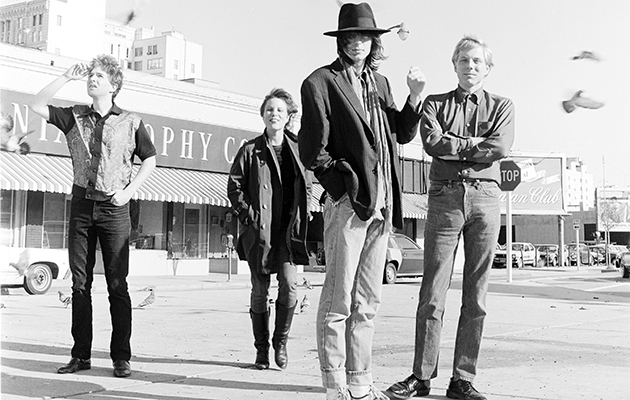In 1982, guitar music’s lights seemed to be blinking out all over Europe, as an ascendant synth-pop declared the sound dead. Nostalgia for the ’60s was a laughable idea barely a decade after its end, as pop continued its apparently ceaseless drive into the future. In the US, where The Replacements, Hüsker Dü and hardcore were at least forging an underground response to the times, Steve Wynn remembers even punk already feeling “about a million years ago”, as its energy splintered into inward-turning ghettos.
LA’s ’60s-pining Paisley Underground, creatively led by Wynn’s The Dream Syndicate, with The Rain Parade and nascent Bangles in its ranks, was a radical movement because it reactivated a scorned past. When The Dream Syndicate’s first UK single “Tell Me When It’s Over” was played on Radio 1 it sounded like a sudden beacon of hope, as did REM’s “Radio Free Europe” and, soon, Green On Red. More than The Doors and Love records encoded in the Bunnymen’s DNA, The Dream Syndicate threw a shameless life-line to the sharpest ’60s and ’70s music: “CCR, Crazy Horse, and Bob Dylan”, their US label’s ad noted; the Velvets, every review added, and Big Star and the Stones. Wynn’s obsessive purchase of every Postcard Record he could find in LA absorbed Young Scotland’s ransacking of recent history, too.
These influences seem so obvious now. They weren’t then. These days, when outrunning rock’s past is a full-time job few are applying for, The Dream Syndicate’s debut LP should sound embarrassingly redundant, their mission having succeeded all too well. In fact, benefiting from only having the budget for a single small-hours session, The Days Of Wine And Roses is as timelessly potent as the records that inspired it.
A snare-snap like a starter-pistol opens “Tell Me When It’s Over”, which guitarist Karl Precoda’s fuzz-heavy riff tunnels through, while, with “Stuck Inside Of Mobile…” surely on his mind, Wynn wearily repeats the title phrase. What that phrase’s “it” might be is left mysterious, on an album whose lyrics Literature major Wynn leaves oblique, though the unhealthy habits and affairs they allude to in LA after dark seem plain. The music’s power starts with a rhythm section, drummer Dennis Duck particularly, which shapes every song with a streamlined, sharp momentum more of its time than the ’60s. The Paisley Underground was tagged a psychedelic revival, but punk’s example means the pace here rarely relents.
Precoda’s guitar meanwhile indulges the band’s fantasy that John Coltrane and Archie Shepp’s jazz explorations were theirs to command, as well as garage rock’s rowdy treasures. “Definitely Clean” is some sort of Stonesy, 20th nervous breakdown, until Precoda’s seesawing solo comes on like a speed-freak’s electric misunderstanding of modal jazz. Then the climactic title track unfurls The Dream Syndicate’s whole, wild repertoire: psychedelia at punk pace, barely disguised chunks of “Subterranean Homesick Blues”, a guitar blast like a foghorn in morse code, and the drawled, half-ironic nostalgia of Wynn, a young man in the age of Reagan, not Aquarius.
The six 1982 rehearsal tracks which replace the extras on Rhino’s 2001 edition obviously lack the on-the-fly pop perfection which instinctively disciplines the album’s experiments. Songs destined for 1984’s Sandy Pearlman-produced Medicine Show instead gain a raw, echoing toughness. Amongst several unreleased, unremarkable songs, the eight-and-a-half-minute “Like Mary” is a motorik jam with garage explosions.
The Dream Syndicate led the way into the ’80s’ “post post-punk universe”, Steve Shelley declares in a booklet of peers’ testimonials. The rehearsals show they had more common ground with the East Coast experiments of Sonic Youth (barely recorded in 1982) than was obvious back then. But the alchemising of the ’60s’ most exciting moments into a lucid ’80s classic is The Dream Syndicate’s singular achievement.
Q&A
Steve Wynn
Had you heard these rehearsal tracks since you recorded them?
Not since I took the cassette back home that night. Tapes deteriorate, and sometimes good ideas as well. But it shocked me how modern it sounded. One reason is we were into all the good stuff. People look back and think The Dream Syndicate was this forerunner of Americana. I was as enamoured as anything by what was happening in England. And I can hear it when I hear that record now. There’s a way I’m singing that I never really did again, that has a bit of Julian Cope and Ian McCulloch and Mark E Smith.
1982 was the high-water mark of synth-pop, when many people thought guitar music was on the way out. Were you making a stand with this music?
Definitely. In interviews, a question that came up way too often was, ‘Now, why are you playing guitars? Are you trying to make a statement?’ It was seen as this anachronistic, perverse choice.
What do you remember of recording the album?
To me it seems like yesterday. There was no budget. And we got cheaper rates starting at midnight. We got going then and finished the whole record at 8 in the morning, and all went straight to work at our day-jobs. That wasn’t a weird time to be up at that point in our lives anyway. And it adds this weird fuzziness and haziness, and took the preciousness off. It caught us on a good night.
Interview: Nick Hasted
The History Of Rock – a brand new monthly magazine from the makers of Uncut – a brand new monthly magazine from the makers of Uncut – is now on sale in the UK. Click here for more details.
Uncut: the spiritual home of great rock music.



